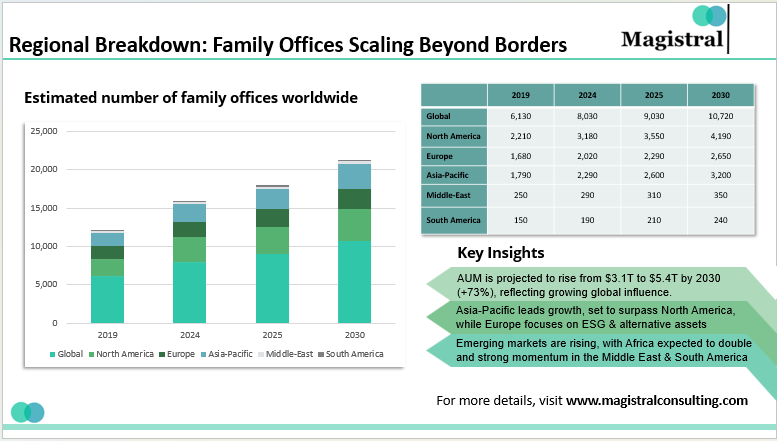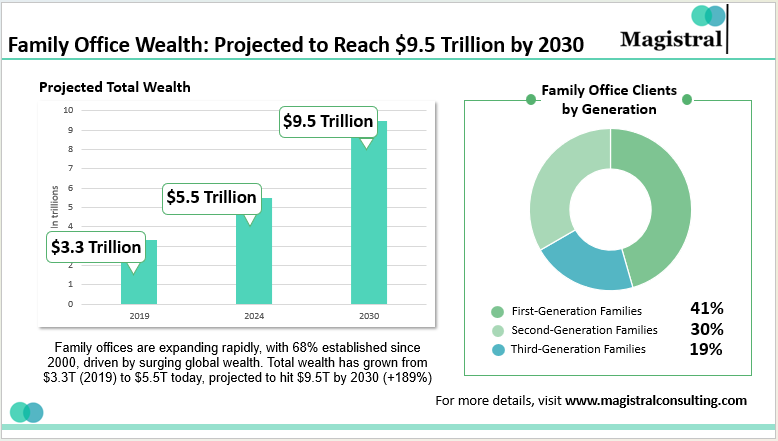Family offices—private firms that manage the wealth of high-net-worth families—are now a force in world finance. They manage more than $5.5 trillion in assets. By 2030, the doubling of these figures to $9.5 trillion will create families that control and influence investment behavior, asset allocation policies, and wealth-management strategies. In contrast to conventional wealth managers, family offices provide more flexibility, long-term orientation, and direct decision-making authority over investments, enabling them to move quickly in response to market changes.
Global Expansion of Family Offices
The rapid rise in family wealth has fueled significant growth in family offices and family office investment, a trend expected to continue. Increasing wealth concentration, successful generational wealth transfers, strong private equity and M&A markets, and the demand for tailored investment strategies are driving this surge.
Currently, 8,030 single-family offices exist globally—a 31% increase from 6,130 in 2019. Projections indicate the number will reach 9,030 in 2025, and by 2030, it is expected to grow by 75%, reaching 10,720.
- Key factors driving this expansion:
• The transition from conventional wealth managers to in-house teams for tailored family office investment approaches.
• Increased direct investment and private equity participation, avoiding fund managers.
• Growing entrepreneurial wealth, especially in technology and emerging markets is impacting family office investment.
Regional Breakdown: Family Offices Scaling Beyond Borders
As family offices expand in size, many are venturing outside of a single location. Currently, 28% of family offices run multiple branches, while another 12% plan to open additional offices. North America and Asia Pacific represent the two main areas for these family offices, with the highest projection of expansion in each region at 34%, followed by Europe at 24%. Family offices increasingly set up branches in Singapore and Dubai, benefiting from tax incentives and global connectivity.

Regional Breakdown: Family Offices Scaling Beyond Borders
As family offices expand, they are also increasing total assets under management (AUM). Currently at $3.1 trillion, AUM is projected to rise 73% to $5.4 trillion by 2030, reflecting its growing influence in global wealth management. Here is the regional breakdown:
Asia-Pacific (Fast Growth)
The APAC region has already surpassed Europe with 2,290 offices and will outstrip North America by 2030. Wealth from China, Singapore, and India is driving this growth.
North America (Largest Market)
North America currently has 3,180 family offices. The industry will expand by 90%, growing from 2,210 in 2019 to 4,190 by 2030. Robust private markets and tax-effective estate planning are driving this growth.
Europe (Stable Growth)
Currently, there are 2,020 offices in Europe, growing by 650 to a number expected to reach 2,650 by 2030. There is an emphasis on ESG investing and alternative assets.
Emerging Markets (Middle East, South America, Africa)
In numbers, Africa is at the lowest, but it is expected to double its numbers by 2030 as wealth rises.
Family Office Wealth: Projected to Reach $9.5 Trillion by 2030
Since the millennium, a sharp increase in global family wealth has driven the establishment of 68% of family offices. Families with family offices have surged their total wealth by 67%, growing from $3.3 trillion in 2019 to $5.5 trillion today. They project this wealth will reach $9.5 trillion by 2030, marking a 189% increase.

Family Office Wealth: Projected to Reach $9.5 Trillion by 2030
The landscape is changing because of this rapid accumulation of wealth, with 41% of family offices catering to first-generation families, 30% to second-generation families, and 19% to third-generation families. Meanwhile, the exploding growth of wealth implies greater demand for structured wealth management, thus driving ever more sophisticated family offices.
Family Office Investment Landscape
Family offices showed a strong preference for education and renewable energy fields that received the highest volume and value of impact investments last year. High deal flow continued to characterize wind and solar power generation; hence, such deals align with the larger trend of climate tech funding. The share of climate tech investment in energy-related startups rose to nearly 35%, from 30% last year.
There is, however, an underfunding of industrial sector climate tech startups in relation to total sector emissions, while food and agriculture are also feeling the pinch of capital crunch. Also, affordable housing received low-impact investment to some degree owing to recent lower yields in the sector. Family office investment is typically made in impact projects through club deals and collaborative efforts with other investors to drive situations forward instead of by themselves.
Since 2014, at least 66% of all family office impact investment have been similarly arranged as club deals. That peak during 2021-2022 saw four out of five impact investments being co-investments; loyalty to shared investment strategies characterized the landscape.
What’s Next for Family Office Investment in 2025
Key shifts in global markets are reshaping family office investment—here’s what to expect in 2025-
Emerging Global Hubs
While New York and London still occupy the two main positions in the financial center landscape, in the race are Hong Kong, Singapore, and Dubai, which have been welcoming family offices mostly due to their favorable regulation and rising affluence in that particular region.
Impact of Trump’s Re-Election
There will be taxation, regulatory, and, of course, market implications in connection with the family office, with Donald Trump’s re-election in the United States once again. Quite a few things should be expected:
- Lower corporate and individual taxes for high earners.
- Extended estate tax exemptions, allowing for larger tax-free wealth transfers.
- Deregulation in some sectors but concerns about market stability.
- Increased tariffs, which could impact global family office investment.
Shift to Private Equity
Private equity now accounts for 30% of family office portfolios, up from 22% in 2021, surpassing public equities, which fell from 34% to 25%.
Direct Investments Over PE Funds
More family offices are bypassing traditional PE funds and investing directly in private companies. 50% plan to make direct investments over the next two years, leveraging their entrepreneurial backgrounds.
Strong Interest in Real Estate
With capital constraints limiting institutional investment, family offices now hold 14.4% of AUM in real estate, benefiting from attractive opportunities and lending terms.
Renewed Interest in Cryptocurrency
After previous volatility, 33% of family offices are now investing in cryptocurrencies, up from 16% in 2021. Among them, 41% with assets under $1 billion are increasing exposure.
Magistral Consulting’s Services for Family Office Investment
Magistral Consulting provides tailored family office investment outsourcing solutions to allow them to maximize investment strategies, maximize operational effectiveness, and maintain long-term wealth. Our services extend to include investment research, due diligence, fund administration, and advisory strategy so that family offices can focus on increasing their wealth while staying in control of their assets.
Direct Investments
Magistral supports family office investment in purchasing high-potential investment prospects. It is done with rigorous deal sourcing, prudent due diligence, and professional valuation assistance. By comprehensive financial analysis and market intelligence, we enable clients to maximize risk management and return on direct investment.
GP/Hedge Fund Selection
The choice of an optimal General Partner (GP) or hedge fund is made with intense research and analysis. Magistral undertakes GP profiling, extensive due diligence, and creation of a fund list prior to setting up meetings with the top fund managers. This aids family office investment in matching with the most successful and most reliable funds existing in the marketplace.
GP/Hedge Fund Performance Monitoring & Reporting
Family offices require continuous oversight of their investments. Magistral provides regular performance tracking, risk exposure analysis, and customized reporting. This is done to ensure that GP and hedge fund investments align with expected returns and risk thresholds.
Portfolio Management
Sound portfolio management is necessary to maintain and grow wealth. Magistral assists family office investment in tracking asset allocation, optimizing investment strategies, and maintaining long-term portfolio performance. Our expertise assists in maintaining balance when dealing with risk as well as optimizing new opportunities.
Fund Strategy & Market Research
Family office investment take well-researched decisions on the basis of in-depth market insight. Magistral conducts country studies to understand macroeconomic and regulatory environments, constructs investment theses for opportunities to grow. We also provide comprehensive industry studies to identify trends and movements in markets. These offerings assist family offices in creating researched-based, forward-looking investment strategies.
About Magistral Consulting
Magistral Consulting has helped multiple funds and companies in outsourcing operations activities. It has service offerings for Private Equity, Venture Capital, Family Offices, Investment Banks, Asset Managers, Hedge Funds, Financial Consultants, Real Estate, REITs, RE funds, Corporates, and Portfolio companies. Its functional expertise is around Deal origination, Deal Execution, Due Diligence, Financial Modelling, Portfolio Management, and Equity Research
For setting up an appointment with a Magistral representative visit www.magistralconsulting.com/contact
About the Author
The article is authored by the Marketing Department of Magistral Consulting. For any business inquiries, you can reach out to prabhash.choudhary@magistralconsulting.com
How many family offices exist globally, and how fast are they growing?
As of 2024, there are 8,030 single-family offices worldwide, a 31% increase from 2019. This number is projected to reach 10,720 by 2030, marking a 75% growth over a decade.
Which regions have the most family offices?
North America leads with 3,180 family offices, expected to grow to 4,190 by 2030. Asia-Pacific follows with 2,290 offices, projected to expand faster than North America. Europe currently has 2,020 offices, while the Middle East, South America, and Africa have smaller but growing numbers.
How much wealth do family offices manage?
Total assets under management (AUM) for family offices currently stand at $3.1 trillion and are expected to grow 73% to $5.4 trillion by 2030. Family wealth, which was $3.3 trillion in 2019, is projected to nearly triple to $9.5 trillion by 2030.

